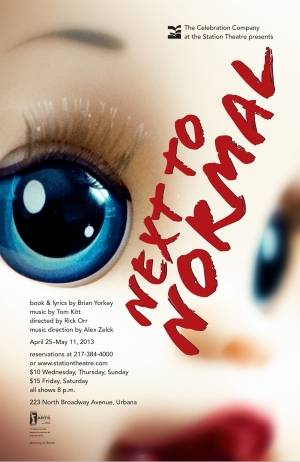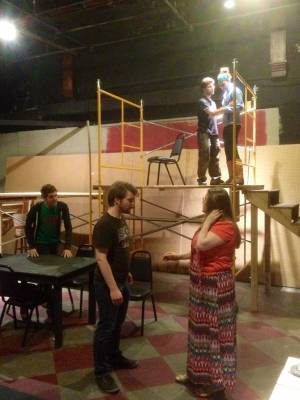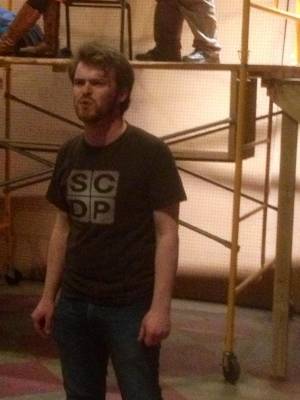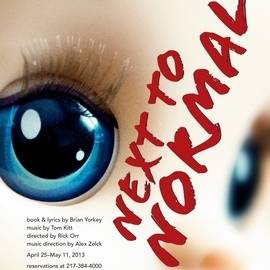 When you think of the accolade “Pulitzer Prize-winner for Drama,” you probably think of searing dramas of literary scope and cultural magnitude. Great fist-pounding-on-a-table plays wherein truths are laid bare and human emotion is cracked with the thunder and lightning of fate. Yeah, that’s probably what you think. That’s what I think, too. And I usually don’t assign that kind of weight or relevance to a musical. I mean, musicals are flittery, fluttery song-and-dance numbers with exposition stitching them together, right? Gee-I’m-Getting-Married kind of fluff.
When you think of the accolade “Pulitzer Prize-winner for Drama,” you probably think of searing dramas of literary scope and cultural magnitude. Great fist-pounding-on-a-table plays wherein truths are laid bare and human emotion is cracked with the thunder and lightning of fate. Yeah, that’s probably what you think. That’s what I think, too. And I usually don’t assign that kind of weight or relevance to a musical. I mean, musicals are flittery, fluttery song-and-dance numbers with exposition stitching them together, right? Gee-I’m-Getting-Married kind of fluff.
Right?
I mean, how often does a musical win the Pulitzer Prize for drama? Well, eight times, to be exact. In 96 years. The last time it happened was 2010, when playwright/lyricist Brian Yorkey and composer Tom Kitt took the prize for their rock musical Next to Normal.
In promotional materials for the touring production of the show, the plot is described thusly:
Next to Normal tells the story of a mother, Diane Goodman, who struggles with bipolar disorder and the effect that her illness has on her family. This contemporary musical is an emotional powerhouse that addresses such issues as grieving a loss, ethics in modern psychiatry, and suburban life. With provocative lyrics and a thrilling score, this musical shows how far two parents will go to keep themselves sane and their family’s world intact.
So … not so much flittery or fluttery.
How often does a musical come along that can take such a big swing at such an important topic? Well, the last time was probably Rent, which also happens to be the last musical before Next to Normal to win a Pulitzer. That’s pretty good company for a show to be in, when you think about it. Literary scope. Cultural magnitude. Great fist-pounding-on-the-table, emotional, thunder-and-lighting sort of company.
This powder keg of a show is about to open at Urbana’s own Station Theatre this Thursday, April 25, under the direction of the Station’s artistic director, Rick Orr (pictured below). In 41 seasons, Orr has done a little bit of everything. Wait — strike that. He’s done a lot of everything.
 When I first got an inkling of Next to Normal’s power, it was in the kitchen of Orr’s home. There were a few of us Station Theatre folk gathered to watch the Tony Awards. We were talking and joking throughout the evening, enjoying the quippy speeches, and rolling our eyes at the Hollywood actors who won awards over people who had been working in the legit theater for a lifetime. And, like all theatre lovers, we fell reverently silent whenever it was time for a big musical number. One of those numbers, that night, was a confrontation scene between the show’s main character, Diane, and her husband. And there, front and center, was Alice Ripley, who originated the role on Broadway, and she absolutely killed it.
When I first got an inkling of Next to Normal’s power, it was in the kitchen of Orr’s home. There were a few of us Station Theatre folk gathered to watch the Tony Awards. We were talking and joking throughout the evening, enjoying the quippy speeches, and rolling our eyes at the Hollywood actors who won awards over people who had been working in the legit theater for a lifetime. And, like all theatre lovers, we fell reverently silent whenever it was time for a big musical number. One of those numbers, that night, was a confrontation scene between the show’s main character, Diane, and her husband. And there, front and center, was Alice Ripley, who originated the role on Broadway, and she absolutely killed it.
We were all sort of stunned. We had all heard of the show, and Rick had told us how good it was supposed to be. But when we heard her snarl and belt her way through that hard-charging argument of a song, we were like deer in stagelights. Deer who couldn’t remember their lines. When it ended, I looked at Rick, who grinned and said, “Told you so.”
I put a few questions about the upcoming Station production to Rick Orr, as well as his music director, Alex Zelck, and his costumer (and Smile Politely contributor), Thom Schnarre. Here’s what they had to say.
~~~~~~
Smile Politely: When did you first become aware of the show? What about it spoke to you, as a director?
Rick Orr: I had read about the making of this musical before it reached Broadway and received several Tony awards. Kitt and Yorkey were college students who wrote a ten-minute piece concerning a bipolar character. That then developed into the current musical, which took ten years to write. I’ve directed musicals before, but this is something of a hybrid musical: small cast of six, dealing with a serious topic, and set to rock music. I was attracted to the dramatic development of the musical with challenging songs that furthered the plot.
 Thom Schnarre: I was first exposed to the musical through the soundtrack. The music drew me in because it’s incredibly challenging and very catchy. I found the concept of a dramatic musical blending the fantastic with the everyday intriguing enough that I ventured to Chicago to see the touring company during their run. This company had many of the principles from the Broadway cast, including Alice Ripley. I was more obsessed with it after seeing the imaginative staging and performances. Ironically, I do not share the musical’s rather bleak view of therapy, but I do love the fact that it deals with all of the ways we attempt to fix ourselves in modern society, and the potential cost of those fixes.
Thom Schnarre: I was first exposed to the musical through the soundtrack. The music drew me in because it’s incredibly challenging and very catchy. I found the concept of a dramatic musical blending the fantastic with the everyday intriguing enough that I ventured to Chicago to see the touring company during their run. This company had many of the principles from the Broadway cast, including Alice Ripley. I was more obsessed with it after seeing the imaginative staging and performances. Ironically, I do not share the musical’s rather bleak view of therapy, but I do love the fact that it deals with all of the ways we attempt to fix ourselves in modern society, and the potential cost of those fixes.
SP: Obviously the Station is a lot smaller than a Broadway house (or nearly anywhere else this show has been staged). What’s the benefit of that closeness for this show?
Orr: It is an ideal musical for the small theatre space. We’ll be using scaffolding, which creates levels, but it will be a very austere set. It is not a realistic environment, which supports the notion of it being “next to normal.”
SP: Clever. Rick, you’ve directed a lot of shows over 41 seasons with the Station. What about directing still appeals to you, after all this time?
 Orr: I have directed about 132 plays and musicals — Some American theatre classics I have directed twice — and each one presents a unique challenge. Always the goal is to provide the truth of a script to a live audience. I have become a bit more picky as to the project that appeal to me, but they all need to have an interesting story or plot development, and above all they must be well-written.
Orr: I have directed about 132 plays and musicals — Some American theatre classics I have directed twice — and each one presents a unique challenge. Always the goal is to provide the truth of a script to a live audience. I have become a bit more picky as to the project that appeal to me, but they all need to have an interesting story or plot development, and above all they must be well-written.
SP: Thom, as a costumer and designer, your role is obviously more than just putting clothes on people. How do you define your role in the production?
Schnarre: My challenges as a costumer are to give the director his or her vision, to make the clothing and accessory choices inform the audience about the character from the moment they enter, and to make the actors feel comfortable and look great! On occasion I get to work on costumes that add a note of commentary and concept to the proceeds. For Next to Normal, Rick wanted the signature red dress seen in the Broadway production. Finding the dress has lead to my adding a sort of ironic retro commentary on the proceedings. I’ve tried to give the characters a 50s/60s sitcom vibe in my fashion choices and then to erode that vibe as the characters lose control. The effect should be an average family being overwhelmed by their circumstances.
SP: Without giving away any “spoilers,” is there anything costume-wise that you’re really excited about in this show? Anything you can’t wait for the audience to see?
Schnarre: I played with dominant and subordinate characters in the piece and  tried to define them with a signature color. The dominant characters of Diana, Gabe, and Natalie are given primary colors: red for Diana, yellow for Gabe, and blue for Natalie. The remaining characters have colors that are blends of the primary characters, so the psychotherapist is orange, a color that is created from Diana and Gabe’s colors. Dan, the father is purple, a blend of his wife and daughter’s colors, and so on. I’ve mixed these with a lot of neutrals. In the end we will see the whole color spectrum represented on stage that should compliment the resolutions each character finds at the end of this journey. The concept is different from the Broadway design, but I think plays well in the close confines of the Station.
tried to define them with a signature color. The dominant characters of Diana, Gabe, and Natalie are given primary colors: red for Diana, yellow for Gabe, and blue for Natalie. The remaining characters have colors that are blends of the primary characters, so the psychotherapist is orange, a color that is created from Diana and Gabe’s colors. Dan, the father is purple, a blend of his wife and daughter’s colors, and so on. I’ve mixed these with a lot of neutrals. In the end we will see the whole color spectrum represented on stage that should compliment the resolutions each character finds at the end of this journey. The concept is different from the Broadway design, but I think plays well in the close confines of the Station.
SP: What about you, Alex? Is there a particular song from this show that really grabs you? Any moment that you can’t wait for an audience to experience.
Alex Zelck: There’s a moment about halfway through the second act where it seems like all the progress the protagonist has made is about to come undone. The desperation and fear that Jodi brings to this moment makes my skin crawl every time.
SP: How many shows have you worked on at the Station, Alex?
Zelck: This my seventh show at the Station, and I’ve assisted as a pianist, actor, arranger, and music director.

SP: Does Next to Normal have any special “challenges” for the musical director, or the band, or the singers?
Zelck: The word I have used most to describe the show is “relentless,” and that quality is a challenge for all parties involved. This show has the musical pacing of a television episode that is trying to cram an hour’s worth of ideas into 22 minutes, except it goes on for over two hours! It will be worth it, for performers and audience members, to push to the bursting cathartic moments where the show comes up for air. As a cast and crew, we have been familiar with the show since January, but every rehearsal this past week has moved one cast member or another to tears.
SP: What opinion, if any, did you have of the show before coming to work on it? Has this opinion changed or possibly become stronger?
Zelck: Before signing on to do the show, I listened to the soundtrack and was honestly only moderately impressed. I was more excited about working with Rick than about the show; the self-diagnosis of my initial assessment is that I am the only person in the world who is not an Alice Ripley fan. But, as is always the case, I grow to love a show by working on it. And this is no exception. A show is never the Official Broadway Soundtrack, but rather a coincidence of performers in a brief amount of time. Our show — the Next to Normal that is Jodi, Andy, Allison, Chris, Dylan, and Steve — is the show that I love and want to share.
~~~~~~
Next to Normal will be the final show of the Station Theatre’s regular season. Performances are April 25–28, May 1–5, and May 8–11. All shows are at 8:00 p.m., and reservations can be made by calling (217) 384-4000 or going to the Station’s website.
Rehearsal photos courtesy of Thom Schnarre. Station Theatre photo by Jesse Folks.








